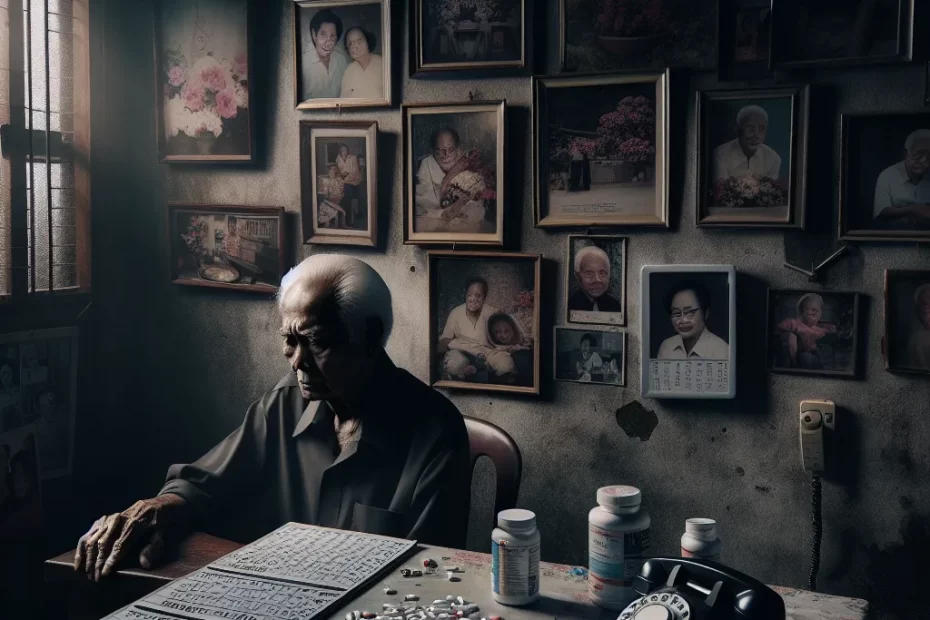Senior suicide is a pressing issue in South Korea, with a growing number of elderly individuals taking their own lives. Understanding the scope of this problem is crucial in developing effective preventive measures and support systems. Risk factors and contributing factors play a significant role in the prevalence of senior suicide, highlighting the need for targeted interventions. However, challenges in mental health support for the elderly population persist, hindering efforts to address this issue effectively. By exploring the complexities of senior suicide in South Korea, we can work towards implementing comprehensive strategies to prevent further loss of life among the elderly.

Understanding the Scope of Senior Suicide in South Korea
Senior suicide in South Korea is a pressing issue that demands our attention. The statistics are alarming, with the suicide rate among the elderly population on the rise. According to recent data, the suicide rate for individuals aged 65 and older in South Korea is approximately 45.2 per 100,000 people. This figure is significantly higher than the average suicide rate in other age groups in the country.
The Complex Factors Behind Senior Suicide
The reasons behind this concerning trend are complex and multifaceted. Social isolation, financial difficulties, and a lack of access to mental health resources are just some of the factors contributing to the high rate of senior suicide in South Korea. The stigma surrounding mental health issues in the elderly population also plays a significant role in preventing individuals from seeking help.
Addressing the Issue
It is crucial for policymakers, healthcare professionals, and the community as a whole to come together to address this issue. By implementing targeted interventions, such as increasing access to mental health services for seniors, raising awareness about the warning signs of suicide, and promoting social connectedness among the elderly population, we can work towards reducing the rate of senior suicide in South Korea.
In addition to addressing the immediate needs of at-risk individuals, it is essential to take a long-term approach to preventing senior suicide. This includes implementing policies that promote healthy aging, providing financial support for elderly individuals in need, and fostering a culture of openness and support when it comes to mental health issues.
By understanding the scope of senior suicide in South Korea and taking proactive steps to address the underlying causes, we can make a meaningful impact in reducing the prevalence of this tragic phenomenon. Together, we can create a society where seniors feel valued, supported, and empowered to seek help when they are in distress. Let’s work together to make a difference and save lives.
Risk Factors and Contributing Factors
In South Korea, senior suicide has become a pressing issue with significant risk factors and contributing factors. Research indicates that social isolation among the elderly population is a key risk factor, with approximately 1 in 5 seniors in South Korea living alone. This sense of loneliness and lack of social support can lead to feelings of hopelessness and despair, increasing the likelihood of suicidal ideation.
Financial Difficulties
Moreover, financial difficulties play a crucial role in senior suicide. Statistics show that a considerable number of elderly individuals in South Korea struggle with poverty, unable to meet their basic needs. The stress and anxiety stemming from financial insecurity can exacerbate mental health issues and contribute to suicidal behavior among seniors.
Health Issues
Health issues also contribute significantly to the risk of senior suicide in South Korea. Chronic illnesses, physical disabilities, and cognitive decline can impact an individual’s quality of life and sense of independence. The burden of managing health conditions, coupled with the fear of becoming a burden to family members, can intensify feelings of worthlessness and despondency.
Cultural Factors
Cultural factors, such as the stigma surrounding mental health and aging, further complicate the issue. In South Korean society, seeking help for mental health concerns is often viewed as a sign of weakness, leading many seniors to suffer in silence. The reluctance to discuss emotional struggles or seek professional help can prevent timely intervention and support for those at risk of suicide.
Family Dynamics
Family dynamics also play a significant role in senior suicide. Conflicts within the family, strained relationships, or lack of familial support can contribute to feelings of isolation and despair among seniors. The breakdown of traditional family structures and changing societal norms have altered the support systems available to the elderly, leaving many vulnerable to mental health challenges.
In conclusion, senior suicide in South Korea is a multifaceted issue influenced by various risk factors and contributing factors. Addressing social isolation, financial hardships, health concerns, cultural stigma, and family dynamics is crucial in preventing further loss of life among the elderly population. By promoting social connections, providing financial assistance, improving access to mental health services, and fostering open conversations about aging and mental well-being, society can work towards creating a safer and more supportive environment for seniors at risk of suicide. Let’s come together to support our seniors and ensure they receive the care and attention they deserve. 🌟👴👵💬
Challenges in Mental Health Support for Elderly Population
In South Korea, the issue of senior suicide has become a growing concern in recent years. The elderly population faces unique challenges when it comes to mental health support, making it crucial to address these issues effectively. According to recent statistics, the suicide rate among the elderly in South Korea is alarmingly high, with individuals aged 65 and older accounting for a significant portion of suicide cases in the country. This highlights the urgent need for improved mental health services tailored to the specific needs of the elderly population.
The Stigma of Seeking Help
One of the key challenges in providing mental health support to the elderly is the stigma associated with seeking help for mental health issues. In Korean culture, there is often a reluctance to openly discuss mental health problems, especially among older generations. This stigma can prevent seniors from seeking the assistance they need, leading to untreated mental health conditions and an increased risk of suicide. Breaking down these barriers and promoting mental health awareness among the elderly is essential in addressing this issue.
Lack of Specialized Services
Another significant challenge is the lack of specialized mental health services for the elderly in South Korea. While there are resources available for mental health support, they may not always be tailored to the unique needs of older individuals. This can result in a gap in care and support for seniors who require specific interventions and treatments for mental health conditions. Developing specialized programs and services targeted at the elderly population can help bridge this gap and ensure that seniors receive the care they need.
Social Isolation
Furthermore, the prevalence of social isolation among the elderly in South Korea exacerbates the challenges in mental health support. Many seniors live alone or have limited social connections, which can contribute to feelings of loneliness and depression. Social isolation is a significant risk factor for mental health issues and can increase the likelihood of suicidal ideation among the elderly. Implementing initiatives that promote social engagement and community support for seniors can play a vital role in enhancing their mental well-being and reducing the risk of suicide.
In conclusion, addressing the challenges in mental health support for the elderly population in South Korea requires a multi-faceted approach that tackles stigma, improves access to specialized services, and promotes social connectedness. By prioritizing the mental health needs of seniors and implementing targeted interventions, we can work towards reducing the incidence of senior suicide and enhancing the overall well-being of the elderly population. It is imperative that we recognize the unique challenges faced by seniors and take proactive steps to provide them with the support and care they deserve.
Preventive Measures and Support Systems
In South Korea, the issue of senior suicide is a growing concern that requires immediate attention and effective strategies to address. According to recent statistics, the suicide rate among elderly individuals in South Korea has been steadily increasing over the past decade, with a significant number of cases reported each year. This alarming trend highlights the urgent need for preventive measures and robust support systems to protect the mental health and well-being of the elderly population.
Key Preventive Measures
One key preventive measure is the implementation of community-based mental health programs specifically tailored to meet the needs of seniors. These programs should focus on promoting social connections, providing access to mental health resources, and offering regular check-ins to assess the mental and emotional state of elderly individuals. By creating a supportive environment within local communities, seniors can feel more connected and less isolated, reducing the risk of suicidal ideation.
Furthermore, it is essential to enhance mental health literacy among the elderly population and their caregivers. Educating seniors about the warning signs of depression, anxiety, and suicidal thoughts can empower them to seek help when needed. Caregivers should also receive training on how to recognize and respond to mental health crises in seniors, ensuring that appropriate support is provided in a timely manner.
Strong Support Systems
In addition to preventive measures, the establishment of strong support systems is crucial in preventing senior suicide. This includes the availability of 24/7 crisis hotlines specifically for seniors, as well as mental health professionals trained to work with elderly individuals. By providing immediate access to professional support and intervention, seniors in distress can receive the help they need to overcome mental health challenges and suicidal thoughts.
Moreover, collaboration between government agencies, healthcare providers, and community organizations is essential to create a comprehensive support network for seniors at risk of suicide. By pooling resources and expertise, these stakeholders can work together to develop targeted interventions, raise awareness about mental health issues among seniors, and ensure that appropriate services are accessible to those in need.
In conclusion, addressing the issue of senior suicide in South Korea requires a multi-faceted approach that combines preventive measures with robust support systems. By implementing community-based mental health programs, enhancing mental health literacy, and establishing strong support networks, we can effectively reduce the incidence of senior suicide and protect the well-being of the elderly population. Together, we can make a difference in the lives of seniors and ensure that they receive the care and support they deserve. Let’s work towards a future where every senior can age with dignity and resilience! 🌟🌿
Senior suicide in South Korea is a pressing issue that requires immediate attention. Understanding the scope of this problem, identifying risk factors, and addressing the challenges in mental health support for the elderly population are crucial steps in preventing further tragedies. By implementing preventive measures and support systems tailored to the specific needs of seniors, we can work towards reducing the alarming rates of senior suicide in the country. It is imperative that society comes together to provide the necessary resources and care for our elderly population, ensuring that they receive the support and assistance they need to live fulfilling and dignified lives. Let us strive to create a society where seniors feel valued, supported, and hopeful for the future.
